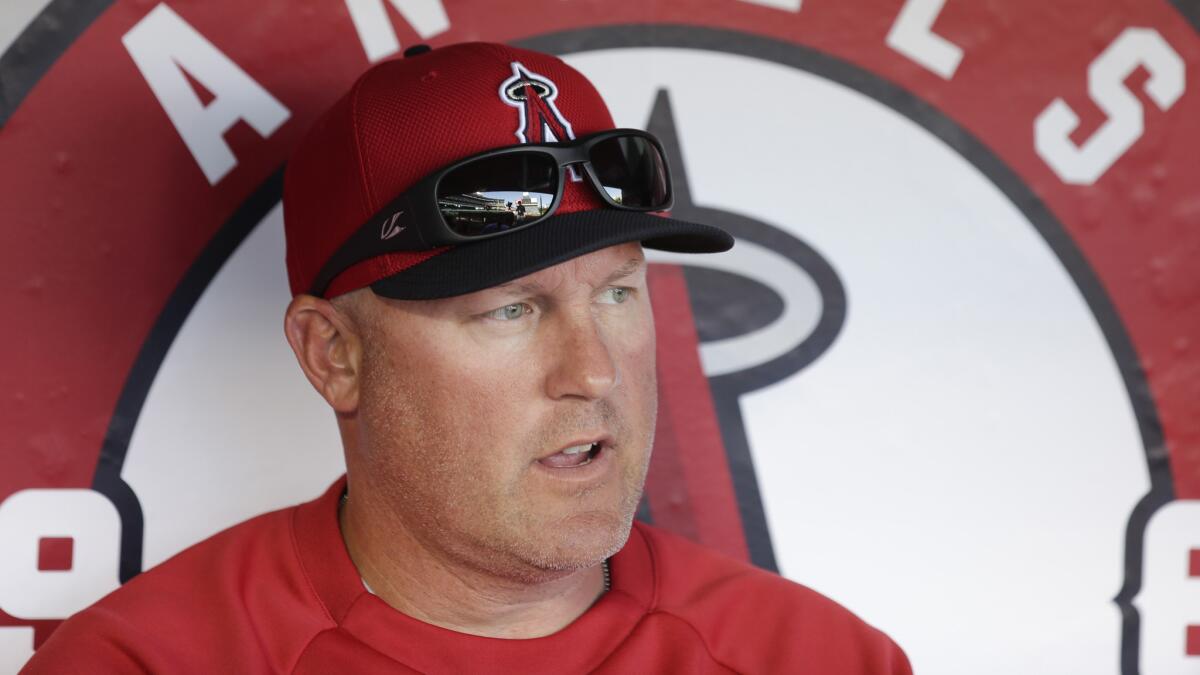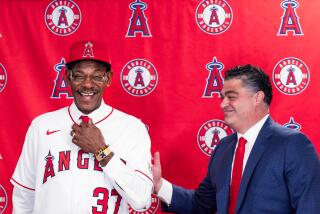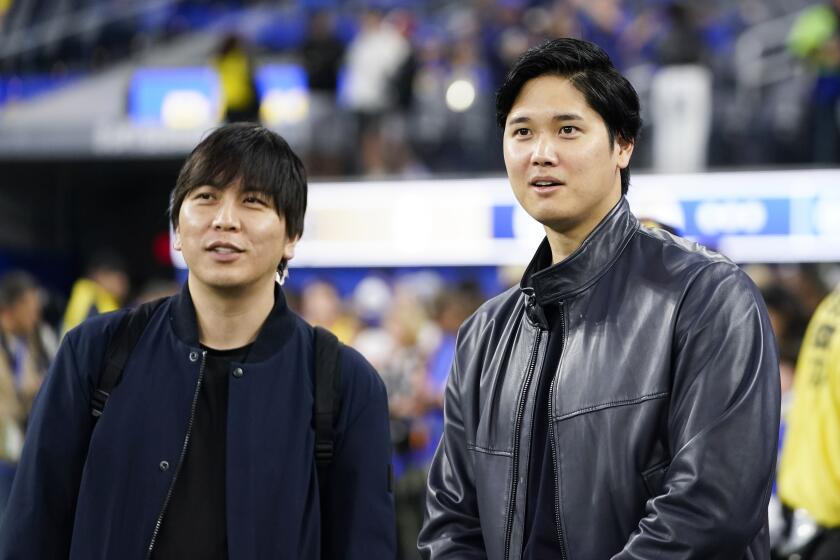Angels pitching coach Mike Butcher has a hot staff, is off hot seat

Reporting from Minneapolis — The criticism of Angels pitching coach Mike Butcher last season was every bit as fierce as that of former hitting coach Mickey Hatcher in the weeks and months leading up to Hatcher’s firing in May 2012.
The 2013 rotation, which included two of the worst starters in baseball — Joe Blanton and Tommy Hanson — was ineffective as a whole, and a bullpen headed by combustible closer Ernesto Frieri and a slew of shaky setup men was a mess.
The Angels, picked by some to reach the World Series, went 78-84 and failed to make the playoffs for the fourth straight season, leading to the dismissal of bench coach Rob Picciolo and hitting coach Jim Eppard.
But Butcher remained, to the surprise of many, and five months into this season, nary a peep has been heard from those who voiced their strong disapproval of Butcher on various media platforms.
The Angels throttled the Minnesota Twins, 14-4, on Sunday in Target Field to complete their fifth sweep of a four-game series this season.
While the offense has picked up, scoring 34 runs in four games against the Twins and banging out a season-high 19 hits Sunday, pitching has fueled the team’s run to baseball’s best record (87-55) and a seven-game division lead over Oakland.
The rotation, despite the loss of Garrett Richards and Tyler Skaggs to season-ending injuries, ranks fifth in the AL with a 3.68 earned-run average and second in opponent average (.239). The bullpen has a 2.39 ERA in 70 games since June 20, the second-best mark in baseball in that span.
“Some criticism is justified, some goes with the territory when your team is not achieving,” Manager Mike Scioscia said. “In Butch’s case, he’s been very consistent in his approach since he’s been here. He’s the biggest reason why this pitching staff has performed at such a high level.”
There is no hint of vindication in his voice as Butcher, a former Angels reliever in his eighth year as pitching coach, talks about the season.
“There’s always going to be naysayers, but the only people I care about are the guys on this staff and this roster,” Butcher, 49, said. “I don’t look at what everyone else says, because it just doesn’t matter what everyone else thinks.”
Certainly, General Manager Jerry Dipoto deserves credit for upgrading the staff. He jettisoned Blanton and Hanson and traded for starters Hector Santiago and Skaggs.
He signed reliable setup man Joe Smith, traded Frieri to Pittsburgh for veteran right-hander Jason Grilli in late June and acquired proven closer Huston Street from San Diego in July.
But it’s not as if Butcher just flips a ball to his pitchers and points them to the mound.
He helped transform Richards from an inconsistent swingman into one of the best young starters in baseball before the right-hander tore the patellar tendon in his left knee on Aug. 20. He suggested Skaggs lengthen the stride in his delivery; the left-hander went 5-5 with a 4.30 ERA before undergoing elbow surgery on Aug. 13.
The veterans have benefited from Butcher’s guidance, as well. In mid-April, after Smith gave up four runs and three hits without recording an out against Oakland, Butcher spent an hour with the right-hander in the outfield during batting practice.
“He talked about slowing things down, taking a deep breath, and he asked me, ‘When’s the last time you did that on the mound?’” Smith said. “It just hit me. I was like, ‘Oh my gosh, I haven’t.’
“I noticed every time I gave up a hit, things would continue to speed up on me, and I wasn’t slowing the game down. After that talk, I started my run.”
Smith is 7-2 with a 1.98 ERA in 69 games and went 10 for 10 in save opportunities before Street arrived. Butcher said he could tell by Smith’s breathing patterns that he wasn’t comfortable on the mound at times in April.
“When you hold all that tension in your body, you lose clarity of what you’re thinking, you lose vision of what you’re seeing, and you can’t finish pitches off,” Butcher said. “When you’re able to relax and breathe, you can take a lot of things in. Tension is a form of stress. It will cause you to rush things.”
Jepsen, a hard-throwing right-hander, was inconsistent in 2013, going 1-3 with a 4.50 ERA in 45 games, but he has been dominant this season, with a 1.96 ERA in 68 games.
“Sometimes we make this game harder than it has to be, but Butch helps me simplify things,” Jepsen said. “Get ahead of batters, put them away when you get a chance. If you’re trying to figure out what pitch to throw to which side of the plate to which batter, sometimes the game speeds up on you.”
Jepsen is pleased that Butcher is “getting the recognition he deserves,” but the six-year veteran knows the coach could be right back on the hot seat next season if the pitchers don’t perform.
“It’s tough when you’re with a team that has grown so accustomed to winning — there’s no room for failure,” Jepsen said. “You don’t make the playoffs for four years, there’s turnover for players and staff. You don’t perform, you’re looking for a new job. It’s a very what-have-you-done-for-me-lately type of game.”
More to Read
Go beyond the scoreboard
Get the latest on L.A.'s teams in the daily Sports Report newsletter.
You may occasionally receive promotional content from the Los Angeles Times.







